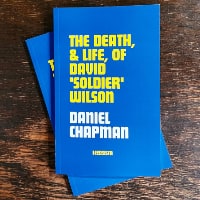The Magic Camera: Norman Hunter vs Franny Lee, 1975
Match of the Day's usual policy was not to sensationalise violence. But a fight between two high profile personalities raised new questions about the role of media in football and society. To Norman Hunter, though, it was all panto.
Finding Derby County in our orbit for the Championship play-offs in 2019 made for a strange time, and a self-inflicted second leg. But it brought a familiar feeling: seeing a club, its staff and its supporters enraged by our club's existence, while we're wondering if we should know them from somewhere. Did we upset Derby at some point, and we've forgotten?
Unlike our underwhelming clashes with the likes of Carlisle and Reading through the fifteen years before Bielsa, Leeds and Derby is at least a rivalry with some pedigree, although as the Rams' fans were singing about Frank Lampard Junior's trophy haul compared to Leeds United's, they did seem to have forgotten their own history in their rush to face off against Leeds.
Any historical rivalry between Leeds and Derby comes down, first, to Don Revie and Brian Clough. Liverpool were United's great rivals for league titles, and that's the way both Revie and his counterpart at Liverpool, Bill Shankly, liked it. Although Shankly was older by fourteen years, Revie's old-fashioned values contributed to a strong friendship built on mutual respect and the exchange of ideas. They'd speak by telephone on Saturday evenings, discussing the day's games; when Leeds pipped Liverpool to win their first title at Anfield in 1969, Shankly ensured there was a case of champagne for the team he said were "worthy champions."
It was a matter of regret for Revie that in 1972, when Leeds lost the chance of a double by losing to Wolves two days after winning the FA Cup at Wembley, the title didn't go to his friend Shankly at Anfield, but to the upstart Brian Clough at Derby's Baseball Ground. Or rather, in the Scilly Isles, where Clough was relaxing on a family holiday while Leeds toiled. Clough was less than ten years younger than Revie, and although that did make him younger than Leeds' centre-half Jack Charlton, on its own it didn't account for the visible generation gap between him and Revie, compared to the philosophical closeness of Revie and Shankly and others like Matt Busby. Clough was new-school, comfortable and outspoken in front of the television cameras that made Revie seem awkward. Like Malcolm Allison, he was as eager for the champagne lifestyle as Revie was for carpet bowls and early nights. Revie and Clough had similar Middlesbrough backgrounds, but they were very different people; at Leeds, Revie was a friend to the staff, generous with bonuses and making sure the tea ladies were included when the team had something to celebrate. Soon after taking over at Derby, the story went, Clough sacked two tea ladies for laughing after a defeat.
Revie admitted that Clough's Derby were, "one of the most exciting young sides to emerge in English soccer in years," but added that, "It would be hypocritical of me to say Derby won the gripping championship race because they were the best side." Clough, now he had a league title to his name, became more forthright.

Although Clough's speech to the Leeds players he had just inherited from Revie in summer 1974 is now famous, he had rehearsed it a year earlier. In 1973 Yorkshire Television took the inexplicable decision to invite Derby's manager to speak at their Sports Personality of the Year dinner at The Queens Hotel in Leeds. The winner was Peter Lorimer, who accepted the award from former Prime Minister Harold Wilson and retired early to prepare for an upcoming match. Clough, though, was just getting started. Standing to speak, he announced that he needed the toilet, which took him ten minutes.
Starting again, Clough said that he had come to pay tribute to sport. But as for Peter Lorimer, he had won his award "despite the fact that he falls when he hasn't been kicked"; Billy Bremner, meanwhile, was "a little cheat"; Eddie Gray's record of injuries was such that if he was a racehorse, he'd have been shot; Leeds United as a whole should be relegated for "cheating" and "cynical football." Clough had come into the heart of Leeds city centre and insulted everybody associated with the club. Lorimer later put it down to gamesmanship because Leeds were playing Derby soon after, but the controversy rumbled for days, and Yorkshire Television cut the speech from the recording they broadcast.
There was no such patience as Lorimer's when Clough recited the updated and extended edition of his speech to the players themselves in 1974, and he had been thoroughly cast out of the city by the time the other great tussle between Leeds and Derby took place, in November 1975. As before, this one was personality driven, and the fallout encompassed themes of soccer behaviour and the ethics of media attention that brought in a new era in the way football is covered and discussed that still shapes coverage today.
And to think, it all started because Norman Hunter punched Franny Lee. Or, more accurately, because Franny Lee dived to win a penalty. Those were the moments that turned a fairly mundane First Division match into a scandal with immediate repercussions, one that has been shown over and over ever since.